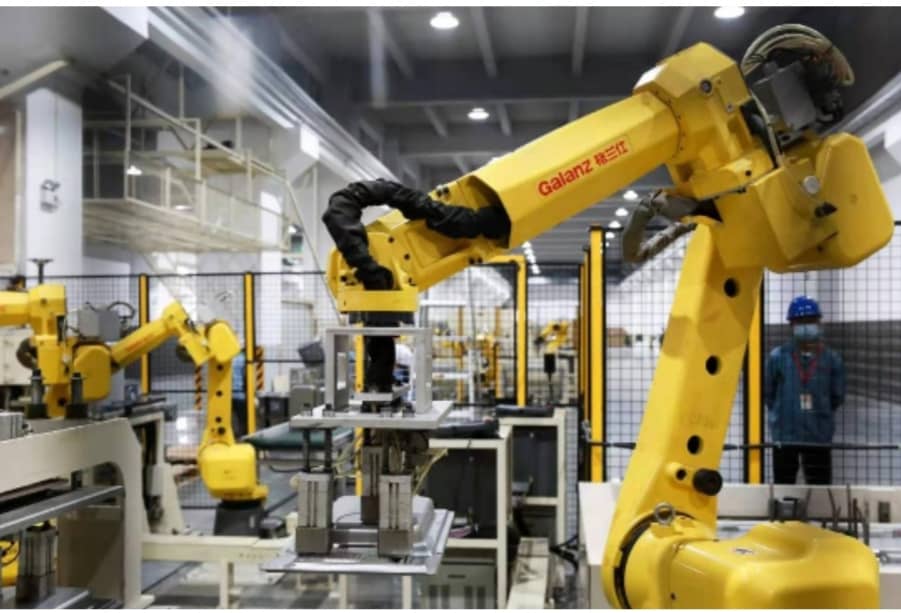Foreign
Half a million enterprises in S China’s Guangdong gain access to cloud services

In South China’s Guangdong Province, more and more enterprises are hopping on the fast train of smart manufacturing. As of the end of March, over 15,000 industrial enterprises had started digital transformation through industrial internet, while more than 500,000 had embraced cloud services.
Last April, Guangdong-based manufacturer of electronic home appliances Galanz put into use the first phase of its Industry 4.0 base in Shunde District of Foshan, Guangdong Province, which is able to produce 11 million microwaves annually. With an precision of 0.1 millimeter, a microwave rolls off a production line every 6.7 seconds. The production process is digitally controlled by cloud services, and the company’s annual microwave production increased by six million sets last year.
“Digital transformation helped us achieve higher efficiency, better quality and stronger competitiveness,” said Liang Zhaoxian, president of Galanz.
The Outline of the 14th Five-Year Plan (2021-2025) for National Economic and Social Development and the Long-Range Objectives Through the Year 2035 proposed to promote in-depth integration of digital technology and real economy, so as to upgrade traditional industries, foster new business forms and models, and strengthen new drivers for economic development.
Under the guidance of the outline, Guangdong Province is going all out to make the manufacturing sector more digitalized, networked and intelligent. A batch of local manufacturers are working to become more advanced and innovative.
BYD, a Chinese automaker headquartered in Guangdong’s Shenzhen, decided to manufacture facial masks at the end of January last year, so as to better meet people’s demand amid COVID-19. In less than three months, it became the world’s largest mask producer regarding the capacity of production.
“What guaranteed the transition were the massive digital and automatic production lines we had built,” said Wang Chuanfu, president of BYD Company Limited.
Digital transformation is important for the auto industry, he told the People’s Daily. After BYD’s global design center established a new digital designing process, ideas, modeling and verification can all be adjusted by programs, he said, adding that the process used to take weeks and even months in the past.
“The key to digital transformation is in-depth reform and optimization of each production link, said Zhang Xiaoyi, chief information officer of Midea, the world’s largest producer of major appliances based in Shunde, Guangdong.
With 5G and industrial internet, over 20 types of microwaves produced by the company are sharing one production line, which shortens delivery period by 56 percent, reduces channel inventory by 40 percent, and improves comprehensive efficiency by 28 percent, according to Zhang.
For medium, small and micro enterprises, Guangdong Province has introduced over 370 outstanding industrial internet platforms and relevant service providers to help them with digital transformation. It precisely matches brand owners, processing plants and raw material providers with respective resources, building a new industrial chain for traditional industrial clusters.
Plastic injection moulding is a 30-billion-yuan ($4.62 billion) industry in Jieyang, Guangdong Province. Over 2,500 enterprises in Jieyang are engaged in the business, 85 percent of which are family workshops. By piloting a collective digital transformation program for industrial clusters, Jieyang improved enterprises’ production efficiency by 20 percent to 40 percent.
With similar approaches, Shunde’s small appliance clusters integrated the whole industrial chain, helping 200 small enterprises shorten delivery period by 1/3, increase per capita output by 1/3 and reduce service staff by 1/3.
Foreign
BREAKING: Trump Orders Investigation into Reported Christian Killings in Nigeria

By: Fabian Apechihin
U.S. President Donald J. Trump has directed lawmakers to launch an immediate investigation into reports of widespread killings of Christians in Nigeria, describing the situation as a “Christian genocide.”
In a statement released Friday evening via his Truth Social platform, Trump expressed grave concern over the violence, blaming radical Islamist groups for what he called a “mass slaughter.”
“Christianity is facing an existential threat in Nigeria. Thousands of Christians are being killed. Radical Islamists are responsible for this mass slaughter,” he wrote.
The U.S. President announced that he is designating Nigeria a “Country of Particular Concern,” citing alarming figures of killings within the country compared to global totals.
“When Christians, or any such group, are slaughtered like is happening in Nigeria — something must be done! I am asking Congressman Riley Moore, together with Chairman Tom Cole and the House Appropriations Committee, to immediately look into this matter and report back to me,” Trump stated.
He added that the United States “cannot stand by while such atrocities are happening,” pledging that his administration remains ready “to protect Christian populations around the world.”
Defence/Security
Polish MEP Raises Alarm Over Killings of Christians in Nigeria

By: Fabian Apechihin
Polish Member of the European Parliament (MEP), Dominik Tarczyński, has once again drawn global attention to what he described as the ongoing persecution and killings of Christians in Nigeria.
In a post on his verified 𝕏 account on Monday, Tarczyński shared an image of a blood-stained Nigerian flag alongside a viral video showing a pastor conducting a burial ceremony for victims of violence.
In the video, the pastor lamented the frequent killings, saying:
“We are tired of performing burial every day, and they expect us to remain silent. It has become an order, and the Nigerian government came out to deny the massacre, saying there is no genocide of Christians in Nigeria. United Nations, you’re watching me. The American Parliament is aware of what we are doing now. My special request is to President Trump to save our lives in Nigeria. They are killing more Christians. If they say they kill Muslims, the Muslims are killed by who? Muslims are killed by Muslims.”
Tarczyński’s post quickly went viral, sparking widespread reactions and renewed calls for the Nigerian government to intensify efforts to combat banditry and terrorism.
However, the Federal Government has repeatedly rejected claims of a religiously targeted genocide. In a recent statement, the Minister of Information and National Orientation, Mohammed Idris, described such allegations as “false, baseless, despicable, and divisive.”
Idris maintained that Nigeria’s security challenges are complex and not driven by religious motives, warning that framing the fight against terrorism as an anti-Christian campaign could deepen existing social and religious divides.
He reiterated the government’s commitment to protecting all Nigerians, regardless of faith or ethnicity, and called on international partners and media outlets to “refrain from narratives that distort the country’s security realities.”
Foreign
Two Dead After Cargo Plane Skids Off Hong Kong Runway Into Sea

By: Fabian Apechihin
Two airport security officers were killed early Monday after a cargo plane skidded off the runway at Hong Kong International Airport, struck their patrol vehicle, and plunged into the sea.

The incident involved Emirates flight EK9788, a Boeing 747 arriving from Dubai around 03:50 local time (19:50 GMT Sunday). The aircraft veered off the north runway, crashed through perimeter fencing, and collided with the patrol vehicle, pushing it into the water. Both occupants of the vehicle died, while the plane’s four crew members survived.
According to officials, the plane ended up partially submerged, making it one of Hong Kong Airport’s deadliest aviation accidents in years. Two other runways remain operational as investigations continue.
Airport operations executive director Steven Yiu said the patrol vehicle had been travelling on a service road outside the runway’s perimeter at a “safe distance” when the plane suddenly turned off course.
“Normally, the plane is not supposed to turn towards the sea,” Yiu said during a press briefing. He emphasized that the patrol car “definitely did not enter the runway” and that the aircraft had not sent a distress signal before landing.
Divers later recovered the bodies of the victims—two men aged 30 and 41—about five meters from the shore and seven meters underwater. One was confirmed dead at the scene, and the other died in hospital.
Hong Kong’s transport bureau expressed condolences to the victims’ families, describing the event as “deeply saddening.”
Emirates confirmed the accident, saying the cargo plane “sustained damage on landing in Hong Kong.” The airline noted there was no cargo onboard and that the aircraft had been wet-leased—meaning operated with crew and insurance—from Turkish carrier ACT Airlines.
Firefighters reached the scene within two minutes, rescuing all four crew members who had escaped via the aircraft’s emergency slides. Photos from the crash site show the plane broken in half, with part of its fuselage submerged in water.
Authorities are now searching for the plane’s flight data and cockpit voice recorders (“black boxes”). A police spokesperson said criminal investigations have not been ruled out.
The affected runway will remain closed pending the outcome of the investigation. At least 11 incoming cargo flights were cancelled on Monday, according to airport authorities.
This is only the second fatal aviation accident at Hong Kong International Airport since it relocated to Chek Lap Kok in 1998. The previous one occurred in 1999, when a China Airlines jet crash-landed during a typhoon, killing three people.
-

 Uncategorized5 years ago
Uncategorized5 years agoFG, states urged to harness flooding for ranching, others with technology – Agbaje
-

 Headlines10 years ago
Headlines10 years agoBreaking: EFCC seals Borno House of Assembly, as Hon members take to their heels
-

 News11 years ago
News11 years agoNigeria Security Operatives Stage Manhunt For Homosexual Perpetrator
-

 News9 years ago
News9 years agoHow 21-year-old Girl fled community over accusation of lesbianism
-

 News10 years ago
News10 years agoYobe Gov Moves Against Deputy
-

 Opinion7 years ago
Opinion7 years ago7 signs she has friend zoned you
-
Technology4 years ago
Online job placement company headhunts women
-

 Headlines10 years ago
Headlines10 years agoBorno Dep Gov Abducts Another Church Leader





